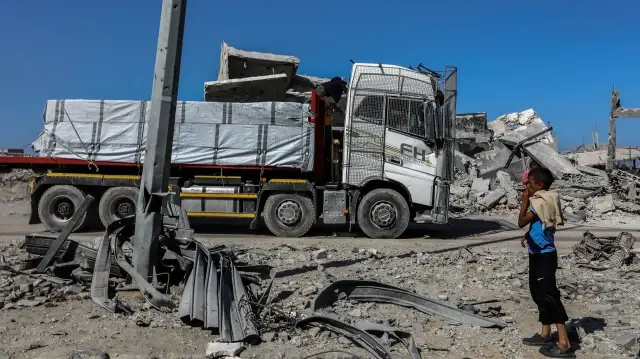UN food agency says Gaza aid access remains critically insufficient

The World Food Programme reports a post-ceasefire increase in food deliveries to Gaza, but warns the amount is still far below the required 2,000 tons per day. Limited access to northern Gaza and insufficient open border crossings continue to severely hinder efforts to stave off famine for the Palestinian population.
The World Food Programme (WFP) stated on Tuesday that while food aid entering Gaza has risen since the ceasefire took effect, the volumes remain critically insufficient to meet the Palestinian population's needs. The UN agency emphasized that ongoing restrictions on access, especially to the north, are the primary obstacle to preventing a widespread hunger crisis.
Deliveries Fall Short of Critical Target
WFP spokesperson Abeer Etefa, speaking in Geneva, confirmed that over 530 trucks carrying approximately 6,700 tons of food have entered the Gaza Strip since the truce began. This quantity is enough to support nearly half a million people for two weeks. While daily deliveries have increased to around 750 tons, this figure is "still well below" the agency's daily target of 2,000 tons required to properly address the hunger crisis.
Expanded Distribution Amid Logistical Hurdles
To improve reach, the WFP has significantly expanded its operational network from five to 26 active distribution points, concentrated in central and southern Gaza. The agency aims to reactivate 145 such points as conditions permit. However, access to northern Gaza and Gaza City remains "extremely limited," with only one small distribution of nutritional supplements for vulnerable groups like mothers and children having been possible. The WFP is also supplying fresh bread through nine bakeries and has initiated a digital voucher program for 50,000 of the most vulnerable people, with plans to scale this to 200,000.
A Plea for Open Crossings and Sustained Truce
The spokesperson urgently called for the opening of all border crossings, noting that current operations are dependent on just two crossings—Karam Shalom and Kissufim—which are inadequate for serving northern Gaza. Etefa stressed that a sustained ceasefire is non-negotiable for effective humanitarian response, stating, "Sustaining the ceasefire is vital. It’s the only way we can save lives and push back on the famine in the north." While market prices have begun to decline with the increased flow of goods, food remains prohibitively expensive for most Gazans.
Reklam yükleniyor...
Reklam yükleniyor...







Comments you share on our site are a valuable resource for other users. Please be respectful of different opinions and other users. Avoid using rude, aggressive, derogatory, or discriminatory language.